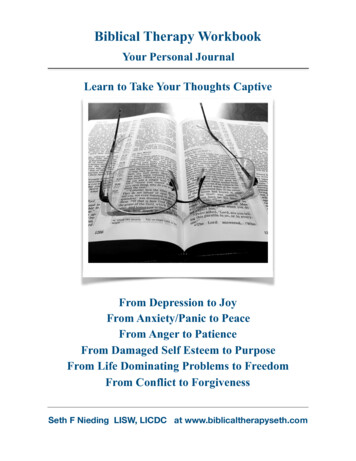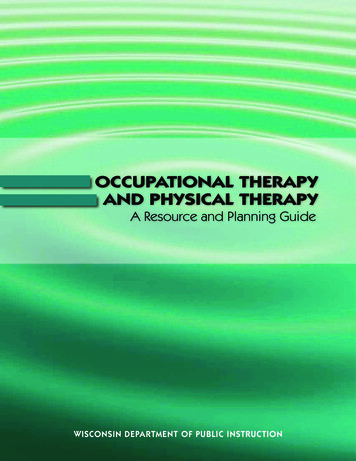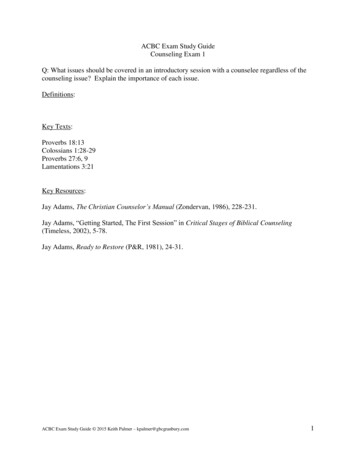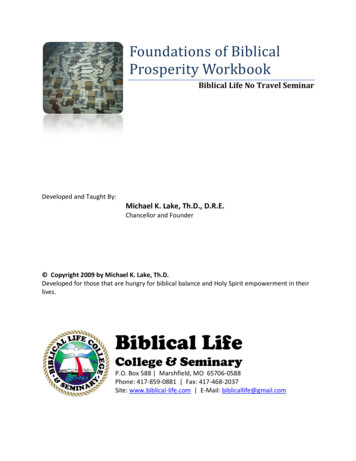
Transcription
Biblical Therapy WorkbookYour Personal JournalLearn to Take Your Thoughts CaptiveFrom Depression to JoyFrom Anxiety/Panic to PeaceFrom Anger to PatienceFrom Damaged Self Esteem to PurposeFrom Life Dominating Problems to FreedomFrom Conflict to ForgivenessSeth F Nieding LISW, LICDC at www.biblicaltherapyseth.com1
IntroductionI do not believe that it is a coincidence or by chance that you have picked up, opened, and arereading this book. I believe that we have encountered a spiritual appointment and that ourworlds have now connected. It is my desire to help you overcome the obstacles that haveblocked you from finding meaning, purpose, and direction for your life. Information alonehowever, does not automatically result in transformation. Many read self-help books, visitmental health websites, read the Bible, and retain only head knowledge. This book however,requires a personal response. It is my prayer that you choose to respond. When you havefinished this book, I would also appreciate you contacting me at my e-mailbiblicaltherapyseth@gmail.com to let me know what impact this book has had on your life.I am writing this self-help workbook for three major purposes. The first purpose is to introduceindividuals who are experiencing severe emotional pain, such as depression, anxiety, anger,and unwanted intrusive thoughts, to the wisdom, hope, and healing power of the Bible. Overthe past 45 years I have served in the capacity as a mental health therapist, chemicaldependency therapist, clinical supervisor, director of hospital-based inpatient and outpatientpsychiatric services, director of residential and outpatient chemical dependency services,owner and therapists of an outpatient mental health group practice, and therapist in privatepractice. When I was director of the Lakeland Institute, one of the 100 best treatment centers inthe United States for alcohol/drug rehab, I contracted with an outside firm to do research onwhat differentiated individuals who had ongoing successful recovery, with total absence fromalcohol and drugs, from individuals who continued to struggle unsuccessfully with repeatedrelapses. At the time I was not very spiritual, and considered myself to be agnostic. Theresearch results indicated that those who were the most successful in their recovery fromalcoholism and chemical dependency were active participants in Alcoholics Anonymous andhad an active spiritual life. Active in Alcoholics Anonymous meant that they attended leadsand/or discussion groups, were involved in a 12 step group and actively worked the 12 stepsof Alcoholics Anonymous, volunteered to assist with meetings, had a relationship with theirhigher power, and also had sponsors who exemplified long-term positive recovery. Those thathad active spiritual lives were active in the church, volunteered to serve the church in somecapacity, read their Bibles, had an active prayer life, participated in small life groups, and hadan accountability partner. In other words, there was a combination of a strong spiritual lifeinvolving a relationship with God, as well as a self-help support group. These two factors takentogether were even more important than the role of professional therapy.I was a mental health therapist long before I became a Christian. I have been a Catholic, aPresbyterian, a Methodist, and a non-denominational Christian. I was a churchgoer but failedto recognize that I needed a relationship with God. When I became a" believer", I did not knowwhat I believed, so I attended the Northeast Ohio extension program of Moody Bible Collegefor seven years. I attended for personal rather than professional reasons. However, my journeytook me to a place where I realized that the Bible provided excellent direction, hope, and powerfor healing depression, anxiety, anger, marital, family, and relational issues. Much of the best ofpsychology has its origins in the Bible.I was able to see many of my patients make dramatic and powerful positive changes in theirlives through the application of Biblical precepts. Beyond that I found great joy and abundantliving in my own life, following and being obedient to the instruction of the Bible.2
My second purpose for writing Biblical Therapy is to alert Protestant, Catholic, andnondenominational Christians to the wisdom of the Bible, which is the foundation of their ownbelief systems. Most religious people seem to think that when they have emotional andrelational problems, that the secular experts in psychiatry, psychology, clinical social work, andmental health counseling, are their best source of help. Unfortunately, in my professional rolesover the past 45 years, I have found that many mental health and chemical dependencyprofessionals are either unaware of and/or reject the Bible as a source of direction, hope,power, and health for healing. Often they reject what they have not studied or even read.My third purpose in writing Biblical Therapy, Your Personal Journal, is to help those who feellost, without purpose or direction. It is my belief that God created each of us, unique as athumb print, unique as our DNA. He gave us our physical appearance, our emotions, ourintellect, our capacity for relationship, and caused or allowed us to go through certain lifeexperiences, all for his purpose. I believe that it is our mission to discover our purpose, and toline up our lives with his purpose for creating us. Once we do this, we can live in alignment andharmony with God and experience what the Bible refers to as the abundant life.Anxiety, damaged self-esteem, depression, anger, marital, sexual, family, parenting, relational,and life dominating problems can be effectively resolved from a clear understanding andobedience to Biblical precepts. Most individuals get lost in their search for answers to theirproblems. They look everywhere including sociology, psychology, medicine, literature, friends,following their own feelings, basing decisions on their personal experiences, turning tofortunetellers, or relying on the most current professional therapeutic treatment fads, but ignorethe wisdom of the Bible. Perhaps you will be surprised that the Bible contains prescriptivetreatment plans for anxiety, damaged self-esteem, depression, anger, marital difficulties, sexualproblems, family problems, parenting issues, relational conflicts, as well as pathologicalgambling, overspending, overeating, alcohol/drug dependence, and other life dominatingproblems. Biblical precepts, if precisely followed, provide hope, health, and the power todramatically and effectively heal our emotional, cognitive, behavioral, and health problems.This message is not my own, but that contained in the Bible, only reorganized in a format tohelp individuals have a positive resolution with their life dominating problems of depression,anxiety, damaged self-esteem; marital, family, and relational conflicts; anger, resentment andlack of forgiveness, sexual difficulties, alcohol/drug abuse, pathological gambling and other lifedominating problems usually referenced as addictions. It is my prayer that you will have victoryand the abundant life that is referenced in the Bible, through finding God's intent and purposefor your life and following his instruction manual.Seth F Nieding LISW, LICDC3
Biblical Therapy Workbook – Your Personal JournalIt is my goal to have Biblical Therapy Workbook – Your Personal Journal distributed and readthroughout the English speaking world. This workbook is a FREE PDF download and can beused by therapists, psychologists, psychiatrists, teachers, pastors, youth leaders, coaches,missionaries, evangelists, mentors, accountability partners, individuals, couples, families, andothers, to overcome emotional, cognitive, behavioral, and character problems; to find purposeand direction; and to lead a life that is pleasing to God.I would appreciate hearing from you regarding your comments, questions, experiences, andtestimonials in using this workbook. I would also appreciate your forwarding a copy of thisworkbook to family, friends, and associates.Webpage: biblicaltherapyseth.comEmail Address: biblicaltherapyseth@gmai.comSeth F Nieding LISW, LICDC4
IndexIntroduction . 2An Explanation of Biblical Therapy .6Hope and Health for Healing 9The Change Process, Victory Over Ourselves 11Role of the Holy Spirit in the Therapeutic Process of the Believer . 19Throw Offs and Put Ons in the Renewal of Self .22Biblical Therapy Case Examples .25From Major Depression to Happiness and Abundant Joy . 46From Anxiety/Panic Attacks to Peace .55Restoring Damaged Self-Esteem with Purpose and Direction 62Couples, Family, and Relational Health 67From Anger to Patience .83From Resentment to Forgiveness 88Sex Problems or Sexual Pleasure 93From Life Dominating Problems to Freedom .98Overcoming Childhood Traumas 102A Hopeful Message about Salvation .107Self-Help Therapeutic Exercises or Counseling Homework Assignments .113Therapeutic Outcomes, Peace and Joy 115Reasons for Therapeutic Failures . 116References .117About the Author and the Author's Mission .1185
An Explanation of Biblical TherapyThe Bible, which is used by Protestants, Catholics, and nondenominational Christians, isaccepted by these communities of faith as the word of God. It is viewed as written by men,inspired by the Holy Spirit, inerrant, and sufficient for addressing the core of all of mans’problems and needs. It is the instruction manual on how we are to live our lives. It isunchanging from generation to generation. Biblical counseling is more than praying forsomeone, it is following the Bible which is God's counsel, in God's format, for accomplishingGod's purpose in our lives. There is a difference between a Christian counselor and Christiancounseling. Many counselors who are Christians follow secular therapy and do not necessarilyemploy the Bible for counsel. The Bible is absolute, unchanging, and cuts through theconfusion of our culture, our emotions, our thoughts, our life experiences, and our deceitfulhearts. Biblical therapy is the process of directing, correcting, freeing, strengthening, teaching,warning, admonishing, healing, and restoring those who are confused, lost, misdirected,rebellious, or trapped in unhealthy or dysfunctional emotional, cognitive, behavioral, and/orrelational patterns. The Bible provides clear direction, hope, and the power for corrective andpositive life change.An Explanation of Being a ChristianBeing a Christian does not mean that we are perfect, strong, or sinless. In fact being aChristian, for the most part, is quite the opposite. We acknowledge that we are imperfect, weakin our own strength, and sinful. Being a Christian is an acknowledgment that we are lost, weakwilled in our own volition to do what is right, and sinful in taking our own path and direction andputting our own will above God's will for our lives. It has been said that being a sinner does notdisqualify us from following God; it is a requirement. We acknowledge that we are in need ofGod's grace, his forgiveness, his love, and his strength in order to find health and healing, andto obtain victory as we continuously struggle through the process of sanctification to becomemore like Jesus. (See section: A Message about Salvation)Biblical References in Support of Biblical TherapyPsalm 119:105 Your word is a lamp to my feet and a light for my path.Colossians 3:16 Let the words of Christ, in all their richness, live in your hearts and make youwise. Use his words to teach, counsel, and admonish one another.Psalm 1:1 Blessed is the man who does not walk in the counsel of the ungodly.1 Timothy 4:11-13 Teach these things and insist that everyone learn them. Don't let anyonethink less of you because you are young. Be an example to all believers in what you teach, inthe way you live, in your love, your faith, and your purity. Until I get there, focus on reading theScriptures to the church, encouraging the believers, and teaching them.6
2 Timothy 3:15-17 You have been taught the Holy Scriptures from childhood, and they havegiven you the wisdom to receive the salvation that comes by trusting in Jesus Christ. AllScripture is God-breathed and is useful for teaching, rebuking, correcting and training inrighteousness. It is God's way of preparing us in every way, fully equipped for every good thingGod wants us to do.Hebrews 4:12 The word of God is full of living power. It is sharper than any double-edgedsword, cutting deep into the inner most thoughts and desires. It exposes the thoughts andintentions of the heart.Galatians 1:11-12 Dear brothers and sisters, I solemnly assure you that the message of thegospel which I preach is not based on mere human reasoning or logic. For my message cameby a direct revelation from Jesus Christ. No one else taught me.It is a good practice to memorize Scripture, so that when a crisis occurs, we have theknowledge and wisdom of God's direction. The Bible illuminates and prescribes good choices.God's word says that we are called upon to teach, counsel, and correct each other. It does notrequire us to have a PhD in clinical psychology, but a familiarity and grounding in the Bible.Many of my clients are in fact more knowledgeable and have memorized more Scripture that Ihave. I have learned much from my clients. With computers we can easily find Biblical versesthat apply to our issues. As a Christian therapist I assist my clients in applying Biblicalknowledge to their specific situation. The Holy Spirit frequently takes over and does a work ontheir hearts and their minds. If you are a good friend you will correct those who you believe aregetting off God's track. The Holy Spirit admonishes us to speak in power and in the love.To speak in power alone may be critical, judgmental, and confrontational. To speak only in lovemay be enabling friends and loved ones to continue to make poor choices. Biblical counselrequires teaching, encouragement, and holding our counselee's accountable. It also requiresthat we walk the talk, so that others see Christ through us and so that we may lead otherscloser, rather than farther, from the truth. The word of God, in and of itself, can fully equip us tohelp one another.Be aware of some secular therapists and some Christian therapist who use secular therapy.They may provide counsel and encourage their clients to follow their feelings, regardless of thenegative impact of their decisions on themselves and others. They may misdirect their clientsto seek happiness, rather than holiness. From a Christian therapy perspective, the only truehappiness comes from first seeking holiness.If you are suffering from emotional and/or relational pain you may wish to seek counsel from aChristian who is firmly grounded in the Bible. If you are firmly grounded in the Bible and knowof others who are suffering from emotional and/or relational pain, you may wish to gentlyapproach and inquire from them if they would like you to disciple and counsel them.7
My personal journal:I will approach (name) to see if theyare willing to disciple and counsel me, and hold me accountable.I will seek out a Christian counselor, who does Christian counseling. A lists of Christiancounselors includes: (names)I will commit to beginning my Christian counseling on (date):8
Hope and Health for HealingOur hope is in Christ and not in ourselves or in our own strength. Our hope is not in otherssuch as our pastors or our therapists. The manual for therapy, which is the Bible, is not basedon human ways, but on God's ways. Believers should have a great anticipation andexpectation for change based on God's word, his promises, and the indwelling and assistanceof the Holy Spirit. This does however require our personal response of obedience. Thistherapeutic approach involves the implementation of Biblical Throw Offs and Biblical Put Ons,which establishes clear treatment plans for action, personal responsibility, and accountability.Throw Offs are the things in our lives that we should deplore, eliminate, disdain, remove, andreplace with Put Ons, which are the things that we should honor, seek, take up, embrace,renew, emulate, and implement in our daily lives. (See section: Throw Offs and Put Ons in theRenewal of Self)Proverbs 3:5-6 Trust in the Lord with all your heart; do not depend on your ownunderstanding. Seek his will in all you do, and he will direct your paths.Proverbs 14:12 There is a way that seems right to a man, but in the end it leads to (spiritual)death.Romans 6:16 Do you not know that when you present yourselves to someone as slaves forobedience, you are slaves of the one you chose to obey, either of sin resulting in (spiritual)death, or of obedience resulting in righteousness?Isaiah 55:8-9 My thoughts are completely different from your thoughts, says the Lord. Andmy ways are far beyond anything you could imagine. For just as the heavens are higher thanthe earth, so are my ways higher than your ways and my thoughts higher than your thoughts.Many believers have utilized the Bible to get back on track, through studying and learning whatthe Bible has to say, and following Biblical precepts. When we are able to Throw Off our oldself, our former nature, and prior emotional, cognitive, behavioral, and relational ways of doingthings, and be reborn, with a new spiritual self, a new nature, and obedience to followingBiblical precepts, we experience dramatic change. Obedience to God's word brings hope andhealth for healing. That change, when it occurs, should be savored and celebrated.Any therapeutic approach that is reliable and effective should also apply to the pastor and thetherapist as well as to the client. Many professional therapists today are being trained insecular forms of therapy, without any degree or licensure requirement that they experiencethose forms of therapy for themselves. Pastors and therapist, being human beings, alsostruggle with emotional, cognitive, behavioral, and relational problems.9
Pastors and Biblical therapists recognize that Biblical therapy has universal and equalapplication for all of us, no matter what our sin life, our position, our role, or our status. Seculartherapy has a vertical relationship between therapist and client.Biblical therapy has a horizontal relationship between therapist and client, and a verticalrelationship between both therapist and client in their relationship with God.Biblical Therapy for the Non-BelieverNonbelievers, whether atheists or agnostics, may also utilize the Bible to find useful, effective,age tested, tools for help in overcoming their emotional, behavioral, cognitive, and relationalproblems. Many are surprised at the wisdom of the Bible and have come to faith and trust inGod, becoming believers. Biblical therapy has served as a pathway for pre-Christiannonbelievers, being led to salvation through acceptance of the authority of the Bible andthrough acceptance of Jesus Christ as their Lord and Savior.10
The Change Process, Victory over Ourselves and Our Emotional and RelationalProblemsWhy do we do what we do? Because of our upbringing, because of our self-esteem, becauseof our personality, because of our education, because of our culture, because of our learnedbehavior, because of our chemical makeup, because of our unmet needs, etc.? What do thefields of sociology, psychology, philosophy, biology, neurology, and psychiatry say about ourmotives?The Bible states that our heart is the source of our choices and the source of our motivation.Luke 6:45 The good man brings good things out of the goods stored up in his heart, and theevil man brings evil things out of the evil stored up in his heart. For out of the overflow of hisheart his mouth speaks.Matthew 12:35 A good person produces good words from a good heart, and an evil personproduces evil words from an evil heart.Jeremiah 17:9 The human heart is most deceitful and desperately wicked. Who really knowshow bad it is?Proverbs 4:23 Above all else, guard your heart, for it determines the course of your life.The Bible does not validate the psychological and sociological perspectives that man isbasically good. We may be self-actualizing by worshiping and serving our own desires,pursuing happiness rather than holiness, and pursuing our own self-centered ambitions, ratherthan living according to God's will for our lives. We cannot totally explain human behavior byour chemical composition or our brain chemistry. One only needs to look at the local, national,and world news to realize the basic sinful nature of man. Emotional, behavioral, and relationalproblems are likely outcomes in the pursuit of our own desires. We do not like to think ofourselves as being sinful or living in sin. Our battle to change, however, is basically againstourselves and our own human sin nature. We need to change the way we perceive, think, feel,and act, in order to have victory over the emotional, cognitive, behavioral, and relationalproblems that we face.James 4:1-3 What is causing the quarrels and fights among you? Is it not a whole army of evildesires at war within you? You want what you don't have, so you scheme and kill to get it. Youare jealous for what others have, and you cannot possess it, so you fight and quarrel to take itaway from them. And yet the reason you do not have what you want is that you do not askGod for it. And even when you ask, you do not get it because your whole motive is wrong - youwant only what will give you pleasure.11
Ephesians 2:1-3 Once you were dead, because of your disobedience and your many sins.You used to live just like the rest of the world, full of sin, obeying Satan, the mighty prince ofthe unseen world. He is the spirit at work in the hearts of those who refuse to obey God. All ofus used to live that way, following the passions and desires of our evil nature. We were bornwith an evil nature, and we were under God's anger just like everyone else.We need truth from outside of ourselves in order to overcome our human nature, our faultythinking, our emotions, our experiences, and the distortions of our cultural influences. We needconsistent, unchanging guidance in order to get on and stay on the right path. The Bibleprovides inerrant and sufficient counsel to overcome our cognitive, emotional, behavioral, andrelational problems.Many of our current problems that we label as diseases, disorders, dysfunctions, or chemicalimbalances, are a medical or psychological reframing of the basic problem of sin. By callingmany of our problems anything other than sin, is to minimize the problem and remove personalresponsibility. We culturally redefine strip bars as gentlemen's clubs, redefine sexual andviolent movies and video games as being for “mature” audiences, redefine killing unbornchildren as freedom of choice, justify extramarital affairs as responses to unmet needs, andremove personal responsibility for divorce by stating that “things” just did not work out. All ofthese decisions result in painful emotional, behavioral, and relational consequences. When wesuffer from depression or anxiety due to our own poor choices, or the poor choices of others,we frequently seek help through medications.This is not to say that some anxieties and depressions, especially where allowed to becomechronic, do not have a biochemical influence. These may respond well or in part to medicationmanagement.When we immerse ourselves in gambling or pornography, we prefer to label ourselves ashaving an addiction or a disorder. A basic definition of sin is a violation of our relationship withGod. A similar definition of sin is putting our will above God's will for our lives. We have free willover our choices. Confession of sin, surrender, and repentance (turning 180 ) are essential tothe process of change. In terms of Alcoholics Anonymous, acknowledging that we have adrinking problem (confession), that we are powerless over alcohol (surrender), and that wecommit to total abstinence from alcohol (repentance or turning 180 ), establishes both personalresponsibility for the problem as well as for the solution.I am not saying that it is a sin to be an alcoholic, to be depressed, to be anxious, to be angry,or to have relational conflicts. However it is a sin, once we know that we have these problems,to continue to feed the problems. For the most part manifestations of depression, anxiety,negativity, anger, and relational conflicts are the result of poor choices by ourselves or byothers. We need to avoid cognitively reframing problems in such a manner that minimizes ordepersonalizes the problem. We need to provide hope through maximizing God and his powerto help us overcome our problems by following his direction. It may just be that our problemsare not too large, but that our faith is too small. We also need to recognize that sanctification,becoming more holy, is a process rather than an event or a destination, fraught with constantly12
struggling against our own sin nature. In terms of Alcoholics Anonymous, expect relapse. Whatwe are incapable of changing under our own power, believers can have victory over sin throughempowerment of the Holy Spirit.Ralph Waldo Emerson stated that if we sow a thought we will reap an action; if we sow anaction we will reap a habit; if we sow a habit we will reap our character; and if we sow ourcharacter we will reap our destiny.It has also been said to be careful of our thoughts, for our thoughts become our words. Becareful of our words, for our words become our actions. Be careful of our actions, for ouractions become our habits. Be careful of our habits, for our habits become our character. Becareful of our character for our character will determine our destiny.We can be deliberate about what we choose to Throw Off, and what we choose to Put On. Wecan add or remove specific people, reading materials, places we frequent, movies, articles ofclothing or how we dress, music, television programs, video games, activities that we engagein, and other things we choose to immerse ourselves in. These daily choices will impact andshape the way we think, the way we feel, the way we act, and the way we relate to others. If weimmerse ourselves in television, in sex and violence, our thoughts, feelings, attitudes, andbehaviors will be influenced in that direction. What goes into us, or more accurately, what wechoose to put into ourselves, will affect what comes out of us. It has been said that we arewhat we eat. Anything we choose to feed will grow, and anything we choose to starve willshrink and eventually die. We need to be more deliberate about what we consume.If we build the foundation for our lives on our careers, our finances, our education or degrees,our pleasurable experiences, our accumulation of material wealth, our popularity, our status, orany other worldly pursuit, we will eventually find ourselves empty, lost, and disappointed. If webuild our lives on the foundation of God's word, the Bible, and on our relationship with JesusChrist, we will find fulfillment, a peace, and a joy, that we can never obtain through medicationsor therapy. As one pastor stated, Jesus plus nothing equals everything. Everything minus Jesusequals nothing. We need to be more deliberate about the foundation upon which we build ourlives.Attitude is also a choice. There is a story of a preacher in California who had two newlyrelocated families joining his congregation on Sunday. The Johnson family inquired as to howpeople were in this new city. The preacher responded by asking them how people were in theirprior hometown. The Johnsons stated that people in their former community were competitive,gossipy, and unfriendly. The preacher responded that unfortunately, the Johnsons would morethan likely find people to be the same way in their new community. The Ryan family alsoinquired as to how people were in this new city. The preacher responded by also asking themhow people were in their prior hometown. The Ryans stated that people in their formercommunity were warm, caring, and friendly. The preacher responded that the Ryans wouldmost likely find people to be the same way in their new community.Changing our thoughts, feelings, attitudes, behaviors, and relationships is a decision of our willto do the Word. It is a matter of choosing obedience rather than following our feelings or doing13
what is customary within our culture. We need to confess our wrong direction, surrender ourwill to God and to Biblical precepts, and take on a willingness to be led by the Holy Spirit.We need to choose righteousness, perhaps at the expense of immediate happiness or shortterm gratification. We need to transfer trust in ourselves to trusting God. God demands changefrom feeling-motivated living to commandment-motivated living. If we immerse ourselves in theBible and God's precepts for our lives, our thoughts, attitudes, feelings, behaviors, andrelationships will be influenced in a positive direction.14
Biblical References in Support of the Change ProcessEphesians 4:22-23 Throw off your old evil nature and your former way of life, which iscorrupted by lust and deception. Instead, there must be a spiritual renewal of your thoughtsand attitudes.Philippians 2:5 Your attitude should be the same as that of Christ Jesus.James 1:22 Do not merely listen to the word, and so deceive yourselves. Do what it says.Matthew 26:39 Jesus went a little farther, falling with his face to
Biblical References in Support of Biblical Therapy Psalm 119:105 Your word is a lamp to my feet and a light for my path. Colossians 3:16 Let the words of Christ, in all their richness, live in your hearts and make you wise. U










